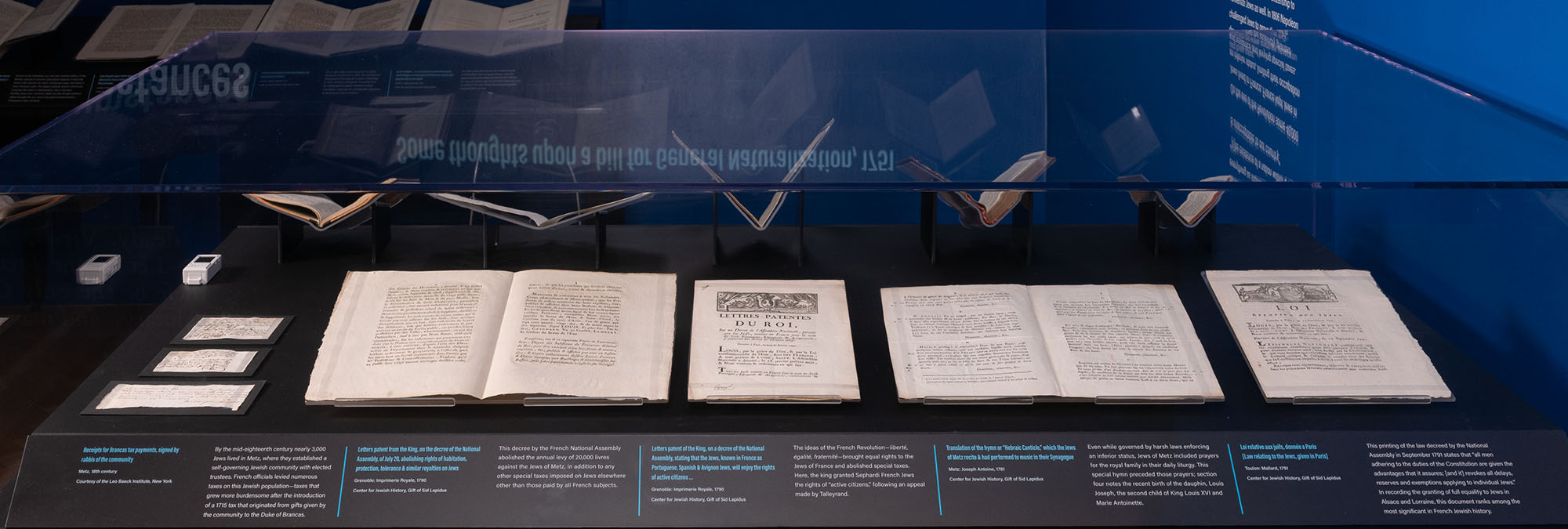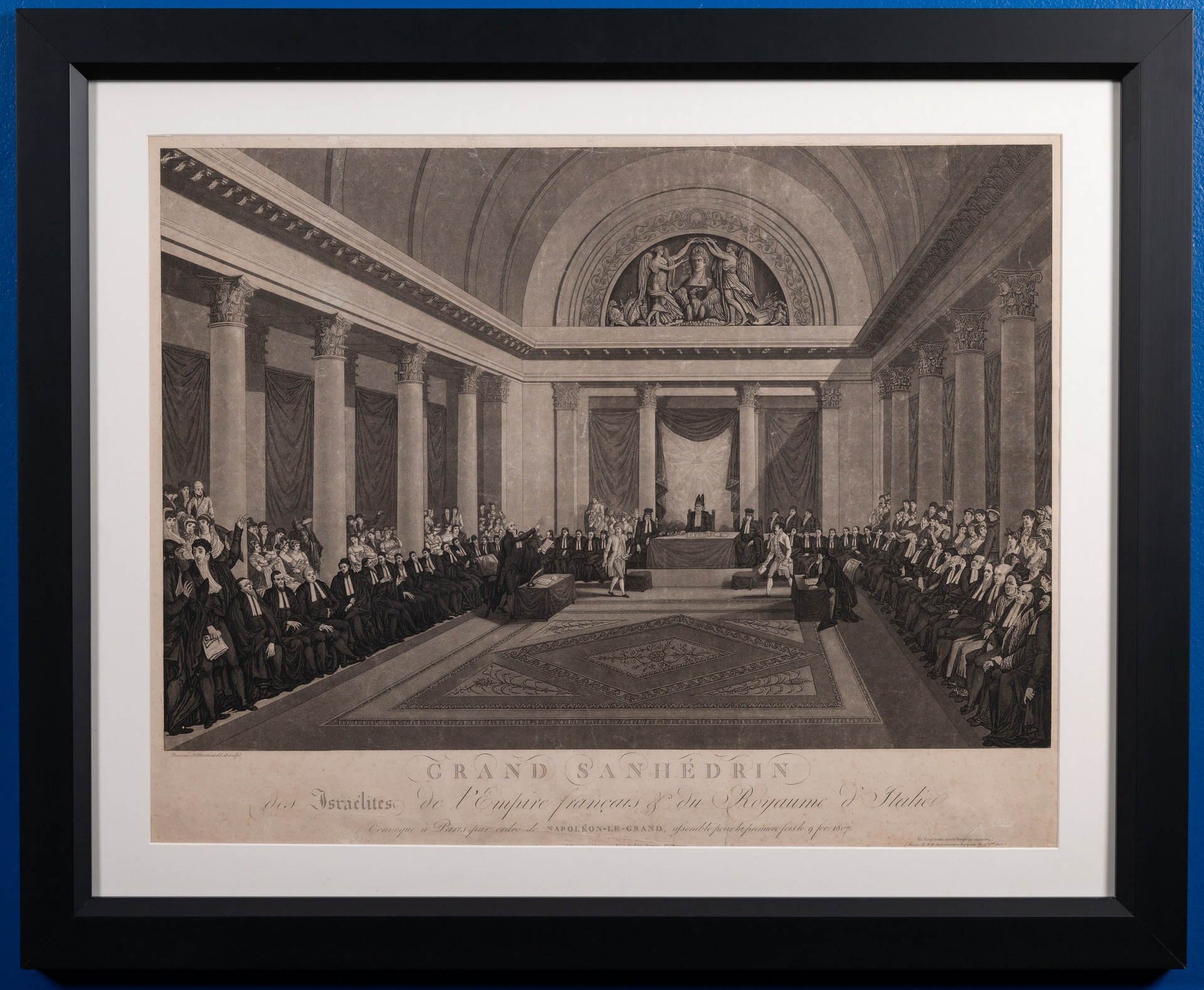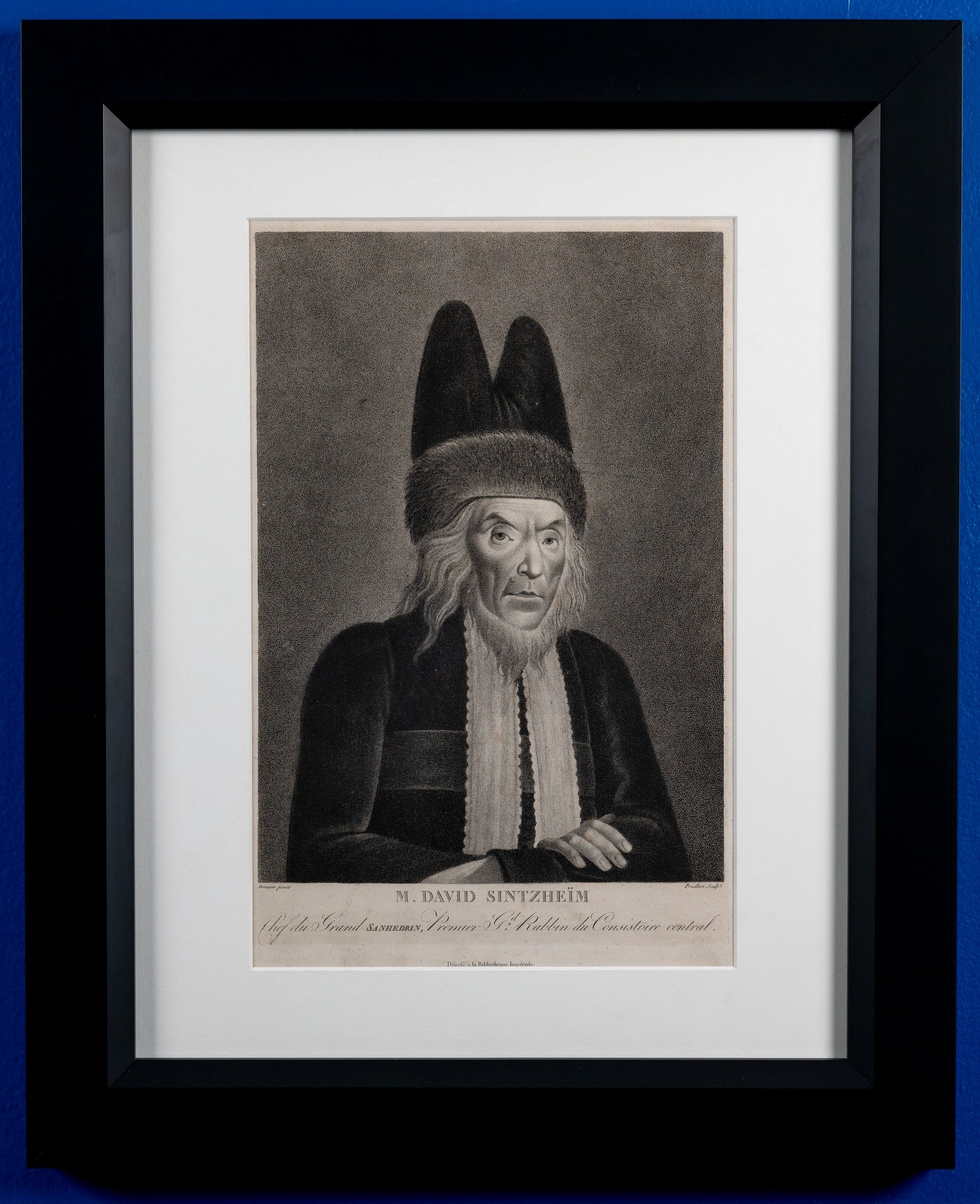Click for 360 tour
In 1789, speaking on behalf of Jewish
emancipation in the French National
Assembly, the Count of Clermont-Tonnerre proclaimed that “Jews should be
denied everything as a nation, but granted
everything as individuals,” adding that
“[t]he existence of a nation within a nation
is unacceptable to our country.”
On the eve of the Revolution some 40,000
Jews lived in France. France kept Jews in
an inferior status, limiting their occupations
and residence and levying special taxes.
In January 1790 the assembly granted
Sephardi Jews full citizenship and in
September 1791 extended citizenship to
Ashkenazi Jews as well. In 1806 Napoleon
challenged Jews to prove that they
deserved the equal status the Revolution
had given them.

Israël-Bernard de Valabrègue
Letter or thoughts of a milord to his correspondent in Paris;
concerning the demand of the Six Corps merchants against
the Jews
London: 1767
Center for Jewish History, Gift of Sid Lapidus
Born in Avignon, Jewish scholar Valabrègue became an
interpreter at the Royal Library (Bibliothèque du Roi). In this
piece he reacts to the opposition by the Six Corps of Paris,
a powerful trade organization of grocers and furriers, to
admitting Jewish members. Valabrègue argues on this page
that if Jews are allowed to “enjoy all the rights of citizens,
they will suddenly have the soul of a citizen.”
Listen to Sid Lapidus speak about Valabregue, one of the first Jews to hold an official position in France without converting to Christianity.
 Read the full text
Read the full text
Abbé Henri Grégoire
Essai sur la régénération physique, morale et politique des Juifs
(An Essay on the Physical, Moral, and Political Regeneration
of the Jews)
Metz: Claude Lamort, 1789
Center for Jewish History, Gift of Sid Lapidus
A friend of the Jews, Grégoire argued that their
degeneration was not inherent, but rather a result of
their inferior legal status. He believed that Jews could
be regenerated and made citizens.
Proclamation Of The King, On a decree of the national
assembly, concerning the Jews ...
Bordeaux: Michel Racle, bookseller, 1790
Center for Jewish History, Gift of Sid Lapidus
 Read the full text
Read the full text
Letters patent from the king, on a decree of the
National Assembly, concerning the conditions
required to be considered French & admitted to the
exercise of the rights of active citizen
Grenoble: Imprimerie Royale, 1790
Center for Jewish History, Gift of Sid Lapidus
The 1790 decree issued for the civic emancipation of the Jews concerned
the Sephardi Jews of Bordeaux and Bayonne, not the Ashkenazi Jewish
communities of Alsace and Lorraine. By 1791 Louis (no longer an
absolute, but rather a constitutional monarch) had extended French
citizenship to aliens who had established continuous residence in the
kingdom for five years, provided they owned real estate or married a
Frenchwoman. However, the question of Jews’ citizenship in Alsace and
Lorraine remained “ajourné” (adjourned) or in abeyance.

 Read the full text
Read the full text
Jacques Godard
Petition of Jews established in France, addressed to the
National Assembly, 28 January 1790, on the adjournment
of 24 December 1789
Paris: Prault, 1790
Center for Jewish History, Gift of Sid Lapidus
Christian lawyer Jacques Godard traveled with
Jewish advocate Zalkind Hourwitz between
revolutionary districts, campaigning on behalf of
Jewish emancipation. Godard argues here that
there is nothing in Judaism incompatible with
French citizenship. Godard also states, on this
page, that the Talmud does not encourage Jews to
return to Palestine until the arrival of the Messiah.
 Read the full text
Read the full text

Receipts for Brancas tax payments, signed by
rabbis of the community
Metz, 18th century
Courtesy of the Leo Baeck Institute, New York
By the mid-eighteenth century nearly 3,000
Jews lived in Metz, where they established a
self-governing Jewish community with elected
trustees. French officials levied numerous
taxes on this Jewish population—taxes that
grew more burdensome after the introduction
of a 1715 tax that originated from gifts given by
the community to the Duke of Brancas.
Letters patent from the King, on the decree of the National
Assembly, of July 20, abolishing rights of habitation,
protection, tolerance & similar royalties on Jews
Grenoble: Imprimerie Royale, 1790
Center for Jewish History, Gift of Sid Lapidus
This decree by the French National Assembly
abolished the annual levy of 20,000 livres
against the Jews of Metz, in addition to any
other special taxes imposed on Jews elsewhere
other than those paid by all French subjects.
Letters patent of the King, on a decree of the National
Assembly, stating that the Jews, known in France as
Portuguese, Spanish & Avignon Jews, will enjoy the rights
of active citizens ...
Grenoble: Imprimerie Royale, 1790
Center for Jewish History, Gift of Sid Lapidus
The ideas of the French Revolution—liberté,
égalité, fraternité—brought equal rights to the
Jews of France and abolished special taxes.
Here, the king granted Sephardi French Jews
the rights of “active citizens,” following an appeal
made by Talleyrand.
 Read the full text
Read the full text
Translation of the hymn or “Hebraic Canticle,” which the Jews
of Metz recite & had performed to music in their Synagogue
Metz: Joseph Antoine, 1781
Center for Jewish History, Gift of Sid Lapidus
Even while governed by harsh laws enforcing
an inferior status, Jews of Metz included prayers
for the royal family in their daily liturgy. This
special hymn preceded those prayers; section
four notes the recent birth of the dauphin, Louis
Joseph, the second child of King Louis XVI and
Marie Antoinette.
 Read the full text
Read the full text
Loi relative aux juifs, donnée a Paris
[Law relating to the Jews, given in Paris]
Toulon: Mallard, 1791
Center for Jewish History, Gift of Sid Lapidus
This printing of the law decreed by the National
Assembly in September 1791 states that “all men
adhering to the duties of the Constitution are given the
advantages that it assures; [and it] revokes all delays,
reserves and exemptions applying to individual Jews.”
In recording the granting of full equality to Jews in
Alsace and Lorraine, this document ranks among the
most significant in French Jewish history.
 Read the full text
Read the full text
In May 1806 Napoleon Bonaparte convened in Paris the Assembly of Jewish Notables: 111 French, Dutch, and Italian rabbis and Jewish leaders, including Ashkenazim and Sephardim. The emperor posed 12 questions to this assembly, designed to determine whether Judaism was compatible with a postrevolutionary France and the new Code Napoléon. The assembly’s answers expressed the Jews’ willingness to renounce their status as a separate corporation.
Napoleon then convened a “Grand Sanhedrin” in Paris to legalize the assembly’s answers. The Sanhedrin embraced individual rights in place of corporate privileges, claiming that the “political dispositions” of Judaism were “no longer applicable, since Israel no longer forms a nation,” while the “religious dispositions” remained valid and binding.

Decree regarding Jewish usury and the debts of
non-merchant (peasant) farmers in certain regions
of the Empire
Paris: Rondonneau, May 30, 1806
Center for Jewish History, Gift of Sid Lapidus
With this document Napoleon initiated
the process of establishing the Assembly
of Jewish Notables. This table shows the
distribution of delegates from regions
across France, Italy, and Holland who would
convene in Paris on July 15, 1806.
 Read the full text
Read the full text
Proclamation to Jewish communities of
Europe inviting them to send delegates to
the Grand Sanhedrin, 1806
Courtesy of The Library of The Jewish
Theological Seminary
Abraham Furtado
Minutes of the meetings of the Assembly of French
Deputies professing the Jewish religion
Paris: Desenne, 1806
Center for Jewish History, Gift of Sid Lapidus
Delegates to the assembly elected as their president Abraham
Furtado, a wealthy Sephardi Jew from Bordeaux. Furtado brought
his political experience and familiarity with Jewish communal
issues to his role. Rabbi David Sintzheim, a notable Talmudist
from Alsace, represented the concerns of Jewish law (halakhah).
Together, Furtado and Sinzheim would lead a committee of 12 to
address Napoleon’s questions and articulate how Jewish law and
Napoleon’s Civil Code were thoroughly compatible.
Listen to Sid Lapidus discuss the timeline for granting citizenship to French Jews.
 Read the full text
Read the full text
M. Diogene Tama and F. D. Kirwan (translator)
Transactions of the Parisian Sanhedrin or,
Acts of the assembly of Israelitish deputies
of France and Italy
London: Charles Taylor, 1807
Center for Jewish History, Gift of Sid Lapidus
A rabbi and merchant, Tama was chosen as the
secretary to a delegate of the Assembly of Jewish
Notables. He diligently kept transcripts of the
proceedings and received permission from the French
minister of the interior to publish them. This printed
transcript reflects the tense encounter between
Napoleon and the delegates as they negotiated the
proper behavior for Jews as citizens.
 Read the full text
Read the full text
Prayer of the Members of the Sanhedrin, Recited in
Their Assembly Convened in Paris on the First Day of
Adar in the Year 5567
Paris: J. J. Marcel, Imprimerie Impériale, 1807
Yeshiva University Museum, 2008.114
As the members of Napoleon’s Sanhedrin
convened in Paris, they prayed both for the
wisdom to guide them in their task and for
their emperor: “Sustained by your right hand,
Lord, it will be easy for us to realize the purity
of our intentions ... and to bring your holy
laws into harmony with those of the state.”
Medal
In Honor of the Grand Sanhedrin of Napoleon
Denon & Depaulis, Rev:
Dupres; France, 1806
Bronze
The Jewish Museum, New York;
Gift of Samuel Friedenberg Collection, FB 145

Le grand Sanhedrin, 1807
Alfred Aron, engraver and printer
Courtesy of The Library of The Jewish Theological
Seminary

Joseph David ben Isaac Sintzheim,
Chief rabbi of Strasbourg and president
of Napoleon’s Sanhedrin
Prud’hon (engraver); Damane (painter)
Courtesy of The Library of The Jewish
Theological Seminary
As the head of a Strasbourg yeshiva
and a recognized expert in Jewish
law Sintzheim bore the responsibility
for addressing Napoleon’s questions
from the perspective of rabbinic law
(halakhah).
